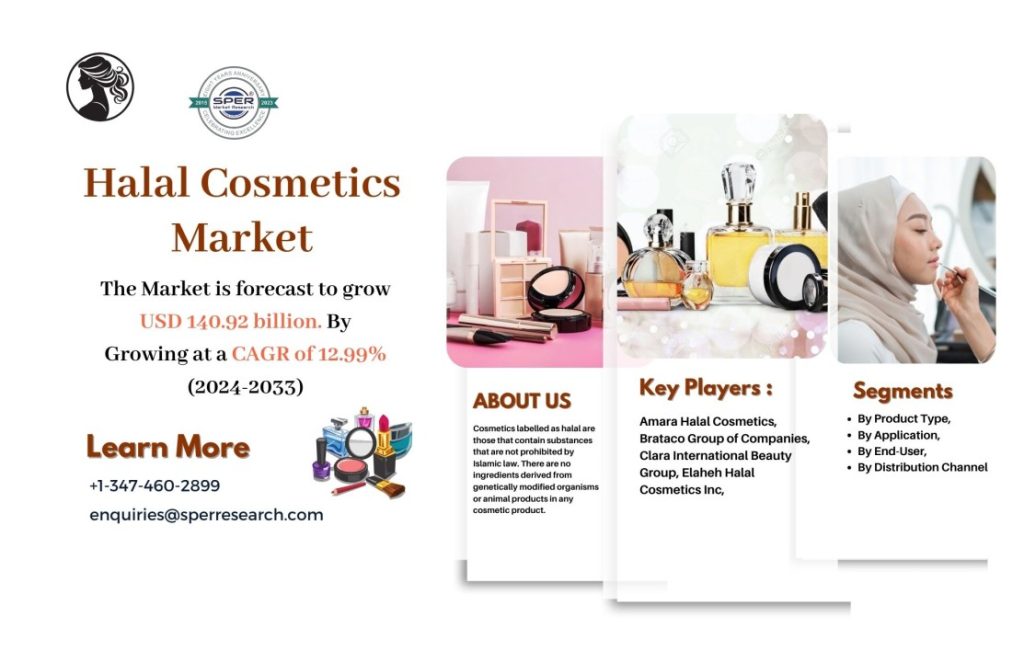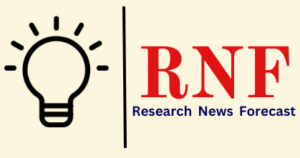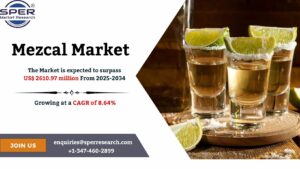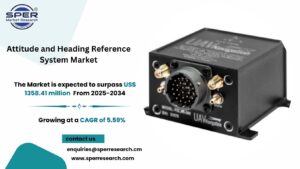Halal Cosmetics Market Growth, Share, Demand, Trends, CAGR Status, Key Players, Challenges, Business Opportunities and Future Competition Till 2033: SPER Market Research

Cosmetics labelled as halal are those that contain substances that are not prohibited by Islamic law. There are no ingredients derived from genetically modified organisms or animal products in any cosmetic product. There is no animal abuse involved with these items. The use of these goods is increasing as a result of a growing trend in personal grooming and the use of beauty products that respect Muslim religious standards. This category includes goods like lipsticks, balms, foundations, skin care products, lotions, creams, and moisturizers, as well as items related to personal hygiene and grooming. The goodness of potent actives and tried-and-true natural substances is added to them. It takes a comprehensive approach to guaranteeing both user and environmental safety.
According to SPER market research, ‘Halal Cosmetics Market Size- By Application, End-User, By Distribution Channel- Regional Outlook, Competitive Strategies and Segment Forecast to 2033’ state that the Global Halal Cosmetics Market is predicted to reach USD 140.92 billion by 2033 with a CAGR of 12.99%.
The growing Muslim population worldwide and consumer awareness of Halal-certified goods are two major drivers propelling the growth of the halal cosmetics industry. Urbanization, changing lifestyles, and an expanding middle-class Muslim consumer base are some of the causes driving this trend. The market’s future looks bright as long as industry participants continue to prioritize rigorous halal certification procedures, research and development, and innovative products. Businesses are devoting resources to the creation of an extensive array of halal-compliant cosmetics, skincare, haircare, makeup, and perfumes. Furthermore, the market is still changing and offering new chances. One such opportunity is the entry of halal cosmetics into conventional retail stores, internet marketplaces, and international markets.
Request For Free Sample Report @ https://www.sperresearch.com/report-store/halal-cosmetics-market.aspx?sample=1
Cosmetics with halal certification are far more expensive than regular cosmetics. Price is still the most important component in the market, even though quality and safety are important considerations for consumers when making purchases. Because of cost, consumers in developing nations like China, India, Brazil, and others are switching from halal to regular cosmetics. Therefore, during the course of the projection period, higher price points are projected to constrain the global market share of halal cosmetics. Furthermore, it might be difficult to verify the halal status of ingredients at every stage of the supply chain, especially for complicated formulas and international corporations that source from a variety of sources. Reaching target consumers and broadening market reach are further hampered by the difficulty of gaining access to and growing distribution channels, particularly in areas where Muslims do not predominate.
Impact of COVID-19 on Global Halal Cosmetics Market
Due to trade and transit limitations brought on by the COVID-19 epidemic, there have been disruptions in the halal cosmetics supply chain, which could result in delays and increased costs. But due to ethical and health concerns, there has been a movement in consumer preferences in the market, with halal cosmetics becoming more and more popular, particularly in nations where Muslims predominate. The pandemic also increased the use of e-commerce, which led to an increase in halal cosmetics sales online as customers favoured the security and ease of home buying. Conversely, the market for cosmetics as a whole, including halal cosmetics, was negatively affected by lower disposable income brought on by job losses and economic uncertainty.
Halal Cosmetics Market Key Players:
Due to the rising demand for vegan cosmetics and body care products in the US, North America accounted for the greatest revenue share geographically. This gives producers of halal cosmetics a chance to build cruelty-free brands and appeal to a larger market. In the US, businesses and customers alike are becoming more and more interested in natural cosmetics. Amara Halal Cosmetics, Brataco Group of Companies, Clara International Beauty Group, Elaheh Halal Cosmetics Inc., and other prominent firms are also some of the major participants in the market.
Global Halal Cosmetics Market Segmentation:
By Product Type: Based on the Product Type, Global Halal Cosmetics Market is segmented as; Personal Care Products, Colour Cosmetics, Fragrances.
By Application: Based on the Application, Global Halal Cosmetics Market is segmented as; Beauty Care, Face Care, Hair Care, Skin Care.
By End-User: Based on the End-User, Global Halal Cosmetics Market is segmented as; Men, Women, Unisex.
By Distribution Channel: Based on the End-User, Global Halal Cosmetics Market is segmented as; Hypermarkets/Supermarkets, Convenience Stores, Specialty Stores, Multi-brand Stores, Online Retailing, Other Sales Channel.
By Region: This research also includes data for Asia-Pacific, Europe, Middle East and Africa, North America, Latin America.
This study also encompasses various drivers and restraining factors of this market for the forecast period. Various growth opportunities are also discussed in the report.
For More Information, refer to below link: –
Related Reports:
Follow Us –
LinkedIn | Instagram | Facebook | Twitter
Contact Us:
Sara Lopes, Business Consultant – U.S.A.
SPER Market Research
+1-347-460-2899





